#chief hong
Text







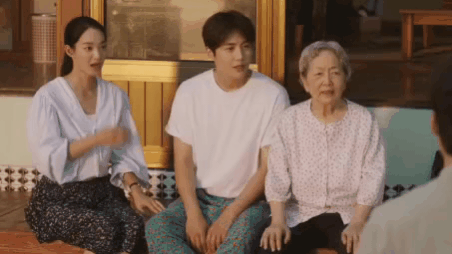

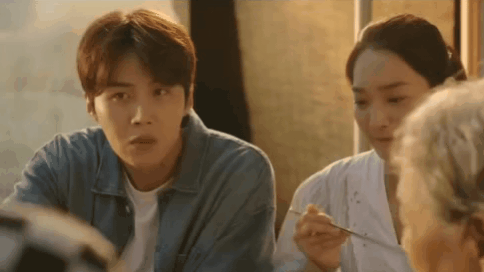
10 notes
·
View notes
Text
I don't know what it is about this photo that makes me ABSOLUTELY Feral!!!!!!!! The innocent soft look of someone who wants to say so much......... I knew he was an amazing actor, but the emotions portrayed in just this one shot are award worthy.

29 notes
·
View notes
Text
I recently finished rewatching hometown cha cha cha and I’m head canoning. I can’t let go of how badly I want a scene where Dusik visits Doha’s father in the hospital after Dusik and Doha have the conversation outside of Dusik’s house.
- Dusik going to the hospital with Hyejin.
- Dusik using honorifics out of guilt because he still blames himself for everything that happened.
- Hyejin just sitting outside in the waiting room.
- Doha not letting Dusik go in by himself because he still feels remorse towards him, and though he accepts that it’s not Dusik’s fault, he still want to put blame on him.
- Everyone crying
- Doha’s father being angry but not expressing it well because he doesn’t believe it’s Dusik’s fault.
- Before they leave, Doha’s father asking Dusik if he brought a drink for him.
#hometown cha cha cha#chief hong#doha#kdrama#headcanon#romance#hometown#hospital#rewatching#obsessive thoughts
4 notes
·
View notes
Text
HIS EYES HIS SMILE THE WAY HE SAYS “That’s disappointing” as if to say “because that’s what my heart does when I’m near you” AND THE WAY SHE LOOKS UP AND IMMEDIATELY LOCKS EYES BC SHE KNOWS EXACTLY WHAT HES SAYING TO HER
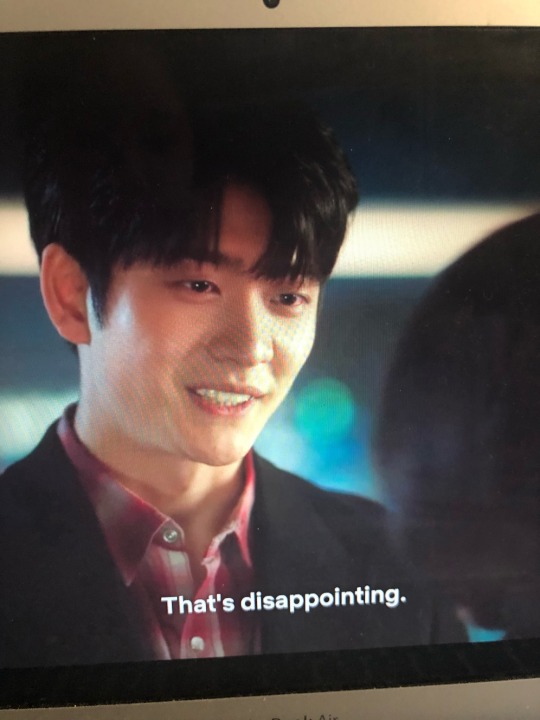
HIS FUCKING HEART EYES
#I have yet to move on from this scene ceebs about dad tbh#chief Hong hold onto your weave#a new heart eyes soft boi male lead has entered the game#come to take your crown for best heart eyes#spoilers#extraordinary attorney woo#Kdrama#Korean drama#Asian drama
42 notes
·
View notes
Text
Maybe I WILL just write a patpran guardian au and put a warning in the tags that they might talk ooc ToT
Idk maybe it's better to exist than not even if I can't do it justice
It is the first writing urge I've had in like 2 months so ;-;
#bad buddy#patpran#guardian#rant#also like. now im invested in like. ink and pa in it#maybe pa is guo changcheng? and didnt know about supernatural things until dad let her get this job?#or shes da qing#and ink is zhu hong except she really does NOT like pat lmao#but she did once?#and korn and wai are clearly human and dixingren and you KNOW they are gonna fight#not sure if i want wai as lao chu. lmao can u imagjne chief pat with fucking wai as his#only dixingren member on the team??? wild#mmm
2 notes
·
View notes
Text
Best Practices in Corporate Risk Management in Hong Kong
With an increasingly complex legal, regulatory, economic, and technological environment, effectively managing organizational risks is critical for companies striving towards sustainable growth in Hong Kong. By taking a strategic approach to identifying key risk exposures and establishing governance policies to address vulnerabilities, both local and multinational corporations can enhance resilience.
Conduct Extensive Risk Assessments
The foundation for building robust risk oversight is to regularly conduct enterprise-wide assessments, tapping perspectives from leaders across functions on risks emerging within main business units, as well as at the corporate level. Special focus should be placed on emerging risks - from supply chain disruptions to fast-evolving cybersecurity threats. Risks posed by Hong Kong regulations and legal responsibilities around data, employment, IP, taxation and import/export controls should also be incorporated.
Appoint Centralized Risk Leadership
While business heads are accountable for risks within their domains, oversight at the core by a Chief Risk Officer and/or risk management committee provides critical independence and cross-functional coordination. Responsibilities span creating risk reporting procedures to keeping senior leadership and board directors appraised, to aligning mitigation plans with corporate strategy. Risk managers also liaise with insurance providers to secure proper coverage against financial hazards.
Implement Key Risk Policies
Findings from risk assessments should drive key policy changes, be it business continuity planning to address operational crises, instituting ethics training to reduce fraud and corruption, or enacting information handling protocols to avoid data leaks, hacking and illegal trading incidents that would undermine Hong Kong stock listings. Anti-money laundering and sanctions/export controls compliance also need special attention in Hong Kong as a gateway between China and global trade.
Monitor External Signals
In addition to internal risk monitoring, closely follow legislative or law enforcement policy shifts, as well as economic/political disruptions arising locally as well as in mainland China that stand to impact operations. Participate in trade groups and maintain contacts in agencies like InvestHK to receive critical market updates. Regular stress tests help evaluate Hong Kong megaprojects like the Greater Bay Area growth plan or One Belt One Road initiative - and gauge ensuing risk reprioritizations.
By approaching risk oversight as an integrated corporate capability monitoring both internal weaknesses and external threats, companies gain enhanced visibility into vulnerabilities which allows preemptively strengthening of operations against cascading Hong Kong/China hazards - thereby boostinglong-term performance and valuation for shareholders.
#Hong Kong risk management#Hong Kong enterprise risk#Hong Kong risk assessment#Hong Kong business risks#Hong Kong operational risks#Hong Kong cybersecurity risks#Hong Kong regulatory risks#Hong Kong legal risks#Hong Kong financial risks#Hong Kong political risks#Hong Kong Chief Risk Officer (CRO)#Hong Kong risk committee#Hong Kong risk governance#Hong Kong risk reporting#Hong Kong risk policies#Hong Kong business continuity planning#Hong Kong fraud prevention#Hong Kong data protection#Hong Kong information security#Hong Kong anti-money laundering#Hong Kong export controls#Hong Kong trade compliance#Hong Kong InvestHK
1 note
·
View note
Text




3 notes
·
View notes
Text
HK CHIEF EXECUTIVE ROLLS OUT PLANS TO BOOST ECONOMY, FINANCE
John Lee, chief executive of the Hong Kong Special Administrative Region (HKSAR), on Wednesday mapped out plans to boost the city’s economy and financial services sector during his first policy address.“In respect of the governance system on government investments, I have asked the financial secretary to set up a new Hong Kong Investment Corporation Limited (HKIC) to further optimize the use of…
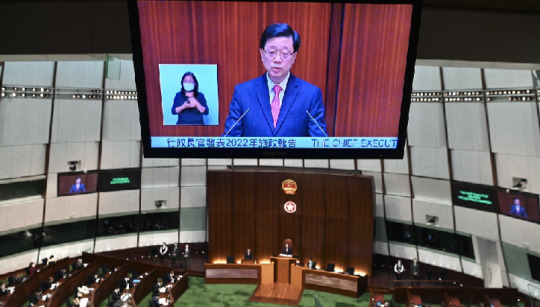
View On WordPress
0 notes
Photo

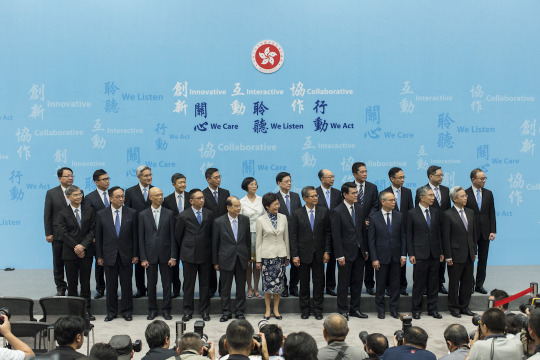
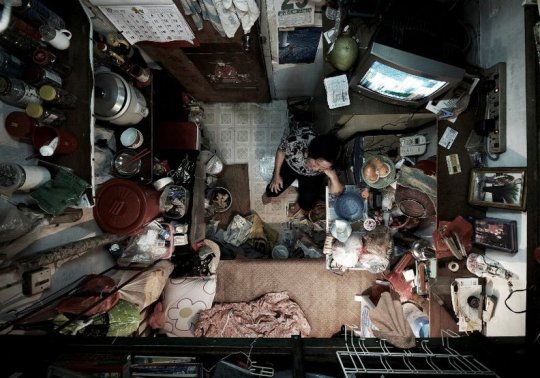

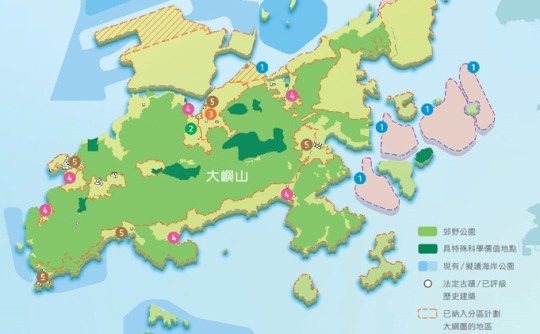





Operational Governance Solves No Social Problem AND Creates More Complicated Ones—Wishing The New CE, A Rigorous Leader, To Turn Over A New Leaf For Hong Kong
Hong Kong is eating itself, firstly its brain and conscience.
Hong Kong has high-quality people. The problem is a matter of mindset and ethics. Now is the time to turn our back on the past. Hong Kong needs a game changer.
‘Second-guess’ expedience, short-term planning, evasive actions and ‘sweep-under-the-carpet’ mentality are, in the dock, the great enemies against good government.
In the colonial days of Hong Kong, governing policies were orchestrated in London, sophisticated diplomats of foreign affairs arrived here and led local officials to implement the planned. After 1997, owing to the political principle of ‘One Country, Two Systems’, Beijing gave a relatively free hand to the local government consisting mainly of native-born administrators who are, with the benefit of hindsight, criticized as being only capable of measuring up to an operational rather than political level of expectations. It was also mistakenly thought that allowing the role of the community oppositions to grow bigger and stronger in Hong Kong was a good thing as the antagonists would constantly question the government, hold them accountable and drive them to be more effective. With the passage of 25 years and sadly contrary to the popular belief, the government in Hong Kong has become weaker, less collaborative and, more so than anything else, distrusted by her people. There are a handful of reasons why this is the case. The Legislative Council, the miniature of a parliament in Hong Kong, turned out to be more of a hindrance than a help when the government tried to solve a problem. Complacency, hesitancy because of meekness, work-shyness, faint-heartedness and lack of expert knowledge of some officials are the common vehement accusations from the public. Even the national government urged time and again the local government in Hong Kong to remove the ‘deep-rooted imbalances and conflicts’(深層次矛盾) in society. Promises unfulfilled and denials about seriousness of social problems caused the citizens to have more bitter perceptions about their government indeed.
In Hong Kong, every problem is clear, every solution is clear but it is, on most occasions, the distance between the two where all the failures lie. For an old economy, we need new thrifts such as technology and culture. For our serious housing shortage, we need more land for development. For delayed treatment in the hospital, we need more resources and better systems. For better equality of wealth, we need more items that can be taxed. For our aging population time bomb, we need higher birth rate. The list of wise suggestions is endless. The challenge is in the doing.
The good public policies and actions play an important role in the lives of every person. A government must commit itself to vigorous decisions and then have able servants to carry out those policies swiftly. 5 stages are involved. A problem that impacts the public should be initially identified. Solutions are put forward and debated. Then, officials will narrow the range of possible policy solutions. Government leaders subsequently make up their mind bravely on a particular course of action that will best address the problem. The above are the ‘What’ aspects. The next 2 steps are concerned with ‘How’ i.e. implementation of the policy. Is legislation or a change of government structure and system required for the policy implementation? Who should take up the tough jobs of execution and what measures should the executive arm adopt? ‘How’ is of course more difficult than ‘What’.
Solutions must be fundamentally effective. In Hong Kong, piecemeal, superficial, devious, effusive, procrastinating and cosmetic actions are often counterproductive as much as self-destructive. People are clever and they can tell if their government is good or bad at, if not sincere or insincere about, solving a problem. When government fails, despair, grudge and un-cooperative attitude as public pressures will mount and this is one of the causes finally leading to the 2019 Riot.
For the past decades since 1997 in which Hong Kong was returned by Britain to China, most of us felt that Hong Kong had been going down because the government suffered from the flaw of ‘no brave decision being made after deliberation and no action or plan, in full bloom, being taken after such decision’.
This is why negative criticisms against the government are bouncing like a ball: the political ‘accountability system’ divides rather than enhances government; education is ineffectual because young people here are becoming disrespectful and rude; a hospital, slow and crowded, has become no place to be sick. ‘The poor getting poorer and the rich getting richer’ is aggravated by the extreme capitalism and ‘housing without people, and people without housing’ is a paradox in Hong Kong.
It is not the social problems per se that are harming Hong Kong. People often said it is the apparent inability of the government to design and take fundamental actions against such problems that is hurting the heart of people of Hong Kong.
Now, Hong Kong will soon have a new Chief Executive John Lee Ka-chiu who has been praised by many as ‘responsible, worldly-wise, willing to listen, courageous, dedicated, visionary, nationalistic and full of experience’. This is apparently encouraging. Great author John Jay Chapman once said, “Good government is the outcome of private virtue.”
All noisy, wordy, confusing and self-serving, in case they are, propositions from the local politicians can really be dispensable IF Hong Kong in future will have a man of true leadership with the long-awaited bravery to stick with a bold course of action, an unconventional way of doing things and an aggressive Hong Kong development roadmap for our disappointed society in the wake of egregious international conflicts.
For the first time in the history of Hong Kong that we have a ‘disciplinary attaché’ (Mr Lee used to be a police officer) to rule Hong Kong. We humbly pray that he could make a refreshing difference. The golden rule for him is simple like this: put yourself in the place of a low-income man with a family to feed in Causeway Bay and start working with your prospects as if all the social problems and sufferings had already bothered you for many years. Wishing Mr. Lee, our Chief Executive, all the best in his challenging years!
MLee
Chinese Version 中文版: https://www.patreon.com/posts/xin-te-shou-li-4-66870047?utm_medium=clipboard_copy&utm_source=copy_to_clipboard&utm_campaign=postshare
Beautiful Hong Kong https://youtu.be/8jFs8rmyw6E Acknowledgement-Majestic Flights
HK Song “Below the Lion Rock” by Andy Lau https://youtu.be/hoXce7XmTm8 Acknowledgement-沈德駿
Mr. John Lee’s CE Election Manifesto https://youtu.be/JglE4-3-KIo Acknowledgement-HK01
Mr. John Lee’s interview https://youtu.be/zsMtiusRasY Acknowledgement-dotdotnews
HK Song “Pearl of the Orient” by Jenny Tseng https://youtu.be/6puIEIT93zI Acknowledgement-沿途有你
HK song “Hong Kong Hong Kong” by Agnes Chan https://youtu.be/OjP_yhEcd_Q Acknowledgement-KaraOK4Ever
Hong Kong Song https://youtu.be/uPtpx5pCoQs Acknowledgement-Peter Dunstan
#John Lee Ka-chiu#John Jay Chapman#Causeway Bay#Second-guess#Accountability System#Disciplinary Attaché#Game Changer#Native-born#Sweep Under The Carpet#Hong Kong Chief Executive#Sino-American Conflict#One Country Two Systems#Deep-rooted Imbalances And Conflicts#Good Government Is The Outcome Of Private Virtue
0 notes
Photo

Oh Yona, from Academy like Yoon Tae-young? "Please stop talking about it" ('Golf King 3')
0 notes
Text
Former security chief who led pro-democracy crackdown anointed Hong Kong's new leader
Former security chief who led pro-democracy crackdown anointed Hong Kong’s new leader
John Lee, 64, was the only candidate in a Beijing-backed one-horse race to succeed outgoing leader Carrie Lam.
His elevation places a security official in the top job for the first time after a tumultuous few years for a city battered by political unrest and debilitating pandemic controls.
Despite the city’s mini-constitution promising universal suffrage, Hong Kong has never been a democracy, the…

View On WordPress
#anointed#breaking news#chief#crackdown#global news#Hong#Kongs#Latest news#latest news and updates#leader#Led#News Churn#prodemocracy#Security
0 notes
Text

Nora Tam - John Lee Ka-Chiu, Hong Kong Chief Executive
0 notes